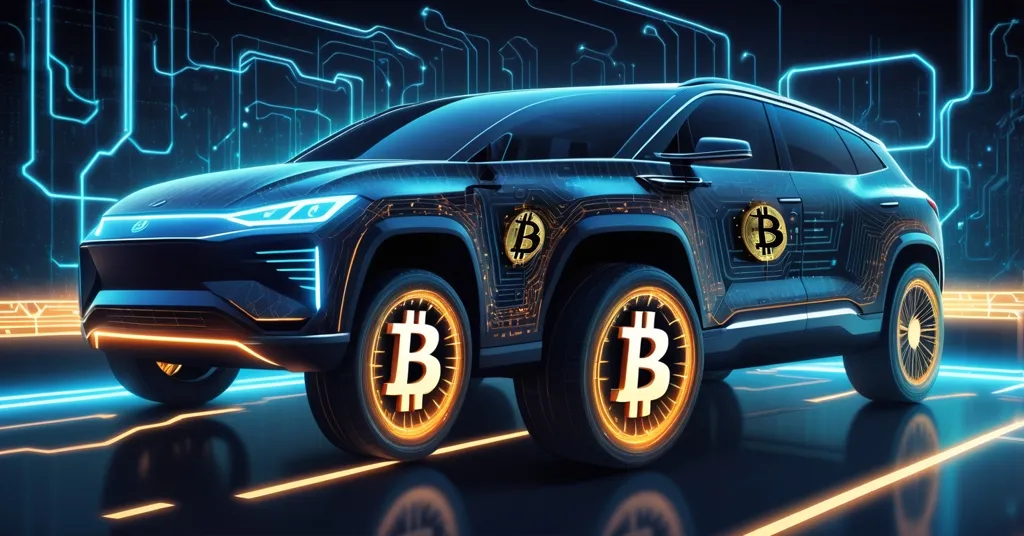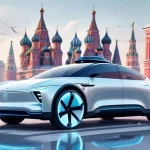Porsche’s 2026 Cayenne Electric SUV: Turbo Power Meets Crypto-Style Disruption

Porsche’s 2026 Cayenne Electric SUV Lineup: Turbo-Charged Disruption with Crypto Parallels
Porsche has ignited a firestorm in the electric vehicle (EV) market with the unveiling of its 2026 Cayenne Electric SUV lineup, delivering performance stats that could make even the staunchest Bitcoin maximalist take notice. The Cayenne Turbo Electric, with a mind-blowing 1,156 PS and a 0-100 km/h sprint in just 2.5 seconds, isn’t just a vehicle—it’s a full-on assault on the fossil fuel establishment, echoing the same rebellious spirit that drives blockchain’s war on centralized finance.
- Two Beasts: Standard Cayenne Electric (408 PS) and the record-shattering Cayenne Turbo Electric (1,156 PS).
- Next-Level Tech: 133kWh battery, 16-minute fast-charging, wireless charging, and over 600 km range.
- Disruption DNA: Mirrors crypto’s challenge to the status quo, though not without hard questions on impact and access.
Let’s break this down with the hood wide open. Porsche, a brand historically tied to the throaty roar of combustion engines in legends like the 911, is now diving headfirst into an electric-powered future. The standard Cayenne Electric is no slouch, packing 408 PS (or 442 PS with a launch control boost) and hitting 100 km/h in 4.8 seconds with a top speed of 230 km/h—more than enough for the daily grind. But the Cayenne Turbo Electric is where things get downright feral: 1,156 PS (equivalent to about 1,139 horsepower), torque peaking at 1,500 Nm, and a top speed of 260 km/h. It blasts from 0 to 100 km/h in a mere 2.5 seconds, with a “Push to Pass” feature adding an extra 176 PS for 10 seconds of pure, unadulterated lunacy. This isn’t just competing with Tesla’s best—it’s gunning to leave them in the dust. For more on this groundbreaking release, check out the full details on the 2026 Cayenne Electric SUV lineup.
The tech powering these machines is where Porsche’s engineering genius shines. Both models house a massive 133kWh lithium-ion battery, roughly enough energy to power a small household for a day. Built on an 800-volt architecture, it supports blistering charging speeds—10% to 80% in just 16 minutes at a 400 kW station. That’s faster than most of us can down a quick espresso. Even cooler, Porsche offers optional wireless charging: park over a special pad, and your SUV drinks up electrons without a single cable. Range numbers are equally striking, with the standard model hitting 642 km and the Turbo at 623 km per charge under WLTP (Worldwide Harmonized Light Vehicles Test Procedure) standards—a global benchmark for estimating range. Keep in mind, real-world mileage can vary based on factors like aggressive driving, cold weather, or heavy loads, but these figures still outpace many EVs on the market today.
Efficiency gets a serious boost too. A recuperation system—essentially recycling the energy lost during braking—captures up to 97% of that power back into the battery, extending range while keeping energy use down to 19.7-21.8 kWh/100 km for the standard model and 20.4-22.3 kWh/100 km for the Turbo. Combine that with all-wheel drive, torque vectoring for razor-sharp cornering, and a suspension designed to keep these heavy hitters glued to the asphalt, and you’ve got a package that’s as much about precision as it is about raw, unfiltered power.
Luxury That Doesn’t Compromise
Inside, the Cayenne Electric lineup screams high-end. A 14.25-inch curved OLED display takes center stage on the dashboard, serving up navigation, media, and vehicle stats with stunning clarity. Practicality hasn’t been sacrificed either, with cargo space and a towing capacity of 3.5 tonnes ensuring this isn’t just a flashy urban toy—it’s ready for real utility. Porsche is selling more than a car here; they’re pitching a lifestyle that pairs eco-consciousness with performance, much like Bitcoin offers financial freedom with a side of cutting-edge tech. But let’s not dodge the obvious: that kind of premium comes with a price tag that’s likely out of reach for most.
Porsche’s Electric Ambition and Industry Context
Porsche’s CEO, Oliver Blume, didn’t mince words about the weight of this launch:
“The fully electric SUVs represent a technological milestone for the brand and a critical step in the firm’s strategy to expand EV offerings across all vehicle segments.”
The excitement was mirrored by the Porsche Retail Group on social media, declaring:
“The new Cayenne Electric has officially been revealed and marks the beginning of a new era for Porsche ⚡ With an astonishing output of up to 850 kW (1,156 PS) and 0–62mph in just 2.5 seconds for the Turbo, this electric SUV becomes the most powerful production Porsche ever.”
This launch isn’t a standalone stunt—it’s a cornerstone of Porsche’s goal to roll out fully electric models across all segments by 2030. Following the success of the Taycan and Macan Electric, the Cayenne lineup cements their commitment to electrification, fueled by tightening global emission regulations and a growing demand for premium EVs. Production is set to begin in 2026, with availability planned for Europe, North America, and Asia. Exact pricing and delivery schedules remain under wraps, but don’t expect these to be budget-friendly—elite performance and luxury rarely are.
Porsche isn’t wading into calm waters here. The Cayenne Turbo Electric locks horns with giants like the Tesla Model X, a titan known for its lightning-fast acceleration and tech-heavy design, as well as the upcoming Mercedes EQS SUV, which promises to fuse opulence with EV innovation. Beyond these heavyweights, smaller EV startups are also entering the fray, much like altcoins challenge Bitcoin’s dominance, pushing the envelope on battery tech and affordability. The high-performance electric SUV space is a cutthroat arena where breakthroughs in charging infrastructure, raw power, and brand prestige decide the winners. Porsche’s got the pedigree, but maintaining a lead will demand relentless innovation.
Disruption Dual: EVs and Crypto’s Shared Rebellion
Now, let’s steer this conversation toward terrain we know well. For us in the Bitcoin and crypto community, the Cayenne Electric isn’t just another shiny toy—it’s a symbol of disruption, mirroring blockchain’s own crusade against centralized power. Just as Bitcoin flips the bird at traditional banking with peer-to-peer code, EVs like these are telling the oil industry to shove it with electron-driven torque. Both embody the spirit of “effective accelerationism” (e/acc)—the idea of speeding up technological progress to reshape systems, no matter the friction. Picture this: a 1,156 PS beast silently tearing up the highway on pure electricity feels as revolutionary as sending a borderless Bitcoin transaction without a banker’s permission.
But let’s cut the starry-eyed bullshit. Disruption is rarely a clean break. These premium EVs, with all their badassery, aren’t exactly tools for the masses—are they really democratizing mobility, or just souped-up toys for the crypto whales and Wall Street elite with spare garage space? And then there’s the environmental elephant in the room. Sure, they’re zero-emission on the road, but crafting a 133kWh battery isn’t a green love story. Mining lithium and cobalt for batteries carries a hefty carbon footprint—some estimates peg it at up to 74 kg of CO2 equivalent per kWh of capacity—and often involves questionable labor practices. Sound familiar? It’s the same heat Bitcoin takes for energy-intensive mining. Both industries are game-changers, but neither escapes the messy reality of their impact.
Here’s where it gets intriguing, though. There’s untapped potential for blockchain and EVs to collide in ways that could redefine both spaces. Imagine tokenized ownership of a Cayenne Electric via Ethereum smart contracts, making buying or leasing as seamless as swapping tokens on a DEX. Or picture decentralized charging networks where drivers pay for juice with crypto, cutting out middlemen and tracking energy trades on a transparent ledger. Even Porsche’s wireless charging tech could inspire peer-to-peer energy sharing, logged on a blockchain. These ideas aren’t sci-fi—they’re the kind of convergences that could turbocharge the future of mobility and finance.
Historical Parallels and Hard Realities
Porsche’s pivot from gas-guzzling icons to electric trailblazers echoes Bitcoin’s own journey from a niche experiment in a 2009 whitepaper to a global financial force. Both started as radical underdogs, scoffed at by the old guard, now driving systemic upheaval. Porsche’s aggressive EV push, much like Bitcoin’s relentless adoption, shows what happens when innovation refuses to slow down. But as we cheer for anything that sticks it to the establishment, we can’t ignore the roadblocks. Accessibility remains a glaring issue—will these SUVs ever be affordable enough for the average hodler, or are they doomed to be status symbols? Scalability and sustainability are also thorns in the side, just as they are for crypto. Battery production’s dirty secrets and charging infrastructure gaps are as real as blockchain’s scaling debates and regulatory headaches.
Looking Down the Road
Porsche is laying down a gauntlet with the 2026 Cayenne Electric lineup, fusing jaw-dropping performance with cutting-edge electric tech. Whether you’re a gearhead fantasizing about flooring a Turbo Electric or a decentralization advocate who gets a kick out of any middle finger to the status quo, this is a narrative of raw innovation that demands attention. Yet, the hard questions linger—about cost, impact, and true reach—much like they do in our crypto world. As we watch these twin revolutions unfold, one thing’s clear: the future of both mobility and money is being rewritten, and it’s one hell of a ride. Just don’t expect to dodge the potholes—or the charging station queues—anytime soon.
Key Questions and Takeaways
- What makes the 2026 Porsche Cayenne Electric SUVs unique in the EV market?
They stand out with unparalleled performance—1,156 PS and a 0-100 km/h in 2.5 seconds for the Turbo—plus a 133kWh battery, 16-minute fast-charging, wireless charging options, and a range exceeding 600 km, positioning them at the pinnacle of luxury EVs. - How does the Cayenne Turbo Electric measure up to competitors like the Tesla Model X?
Its 2.5-second sprint and monstrous power rival the Tesla Model X, with Porsche’s renowned handling potentially giving it an edge in the high-performance EV showdown. - Why should crypto enthusiasts care about Porsche’s electric push?
EVs like these mirror Bitcoin’s disruption of centralized systems, embodying a shared ethos of challenging the old guard, though both face criticism over energy use and accessibility for the broader public. - Could blockchain technology integrate with EVs like the Cayenne Electric?
Absolutely—think tokenized ownership via smart contracts, crypto payments for decentralized charging networks, or blockchain-tracked energy trading, hinting at a future where finance and mobility intersect. - When will these SUVs launch, and who are they really for?
Production kicks off in 2026 across Europe, North America, and Asia, with pricing still undisclosed—expect a steep cost that may limit them to the affluent, much like early crypto adoption faced similar barriers.



